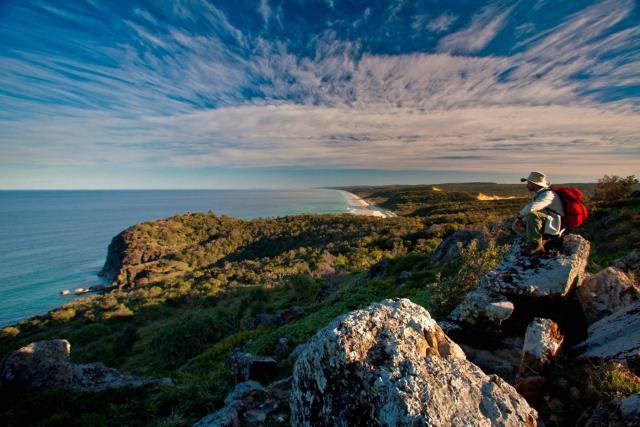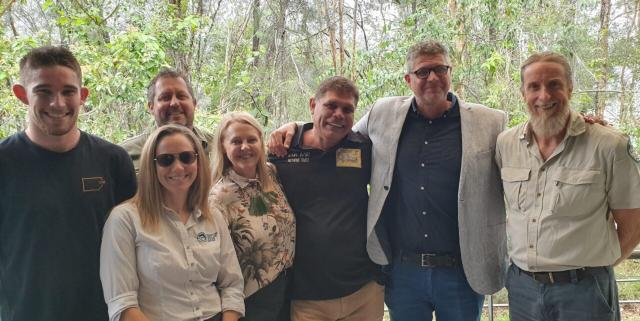In the face of growing opposition to it, the Cooloola Great Walk is still on track to open in early 2023, according to its major commercial partner.
Although construction has not yet begun and is now two years behind its original schedule, no partnership agreements with the Traditional Owners have yet been signed and environmental groups are on the warpath, the founder of the company that won the tender to create Cooloola Great Walk Ecotourism Project says he is “committed to bringing the Cooloola Great Walk and all the incredible experiences of the Sunshine Coast in the regions of Noosa and Gympie to life”.
However, the Department of Environment and Science, which is taking the lead for the Queensland Government on the Great Walk, one of four pilot projects of the Queensland Ecotourism Trails Program, was more circumspect on the timeline.
A DES spokesperson told Noosa Today: “While the original timeline for completion of the eco-camps was 2023, a number of factors may affect those plans, including the current Covid situation and ongoing negotiations with relevant third-parties. The Queensland Government is working with the Kabi Kabi Peoples Aboriginal Corporation across a range of project matters (including site selection, ecological and cultural heritage surveys, and employment), however, as these negotiations are ongoing, specific details cannot be disclosed. No final decision has been made on the design.”
When the award of the tender was announced in late February 2020, Michael Lamprell promised that his company CABN would complete construction of five glamping campsites by the end of the year and be operational by early 2021. Now the project is sticking with the line of an early 2023 opening but the obstacles seem to be mounting.
When he spoke to Noosa Today a year ago, Lamprell conceded that creating off-grid facilities was proving challenging in a Covid-19 year, but said: “At the moment we are working on making the final site selections within the walk, we have all the necessary planning applications in with Gympie Council and we are close to being in the same position with Noosa Shire.”
He also said CABN would work with local suppliers and tradesmen and the Kabi Kabi to craft sustainable tiny eco-cabins made from locally-sourced materials that complement the diverse range of flora.
But one of the major stumbling blocks has been to locate appropriate sites that can be serviced year-round without damaging the surrounding environment, and despite the ongoing smokescreen of commercial in confidence arrangements, the more information that has come out about the sites to be used and the structures planned for them, the more concerned the environmentalists have become.
Another apparent hold-up a year ago were the complex negotiations over the size and roles of the Kabi Kabi workforce, but Kabi project manager Brian Warner told Noosa Today then: “There are always small obstacles along the way, but our people are completely behind CABN and the other stakeholders, and we look forward to a long involvement in the Cooloola Great Walk.”
Today Brian Warner says he can’t comment on the progress of the project because he has signed a non-disclosure agreement.
Michael Lamprell also declined an interview with Noosa Today but agreed to respond to written questions:
NOOSA TODAY: Is there a current timetable for the completion of the CABN glamping sites and opening up the walk? It seems from the CABN website that construction will happen this year and completion by early 2023. Is that still on track?
MICHAEL LAMPRELL: No lease has been signed, all these matters are still under negotiation. CABN’s investment in the project is multi-faceted. We intend on developing programs through additional investment that will bring long-term economic benefit to the Kabi Kabi people. We are working with all stakeholders to achieve these important outcomes together for the region.
NT: Are there any obstacles to completion of the project? I know there has been some pressure from the green lobby about a couple of the sites to be used. Has this been resolved?
ML: The whole process has been very collaborative so far. All stakeholders have spent a significant amount of time on country working through a range of issues with the Traditional Owners of the land and with the community.
NT: Has a partnership with the Kabi Kabi Corporation been completed?
ML: The operations and final designs and partnerships are still part of the negotiation with all stakeholders and not yet finalised.
NT: A website and petition has been launched by a group called Protect Our Parks. Although their mission seems to be preventing any private enterprise in National Parks, they have targeted the CABN involvement in the Cooloola Great Walk. Are you planning to defend the comments made in relation to the size and scope of the planned camping sites? Do you have an environmental protection plan in place that answers their concerns?
ML: CABN is committed to bringing the Cooloola Great Walk and all the incredible experiences of the Sunshine Coast in the regions of Noosa and Gympie to life. We have been working tirelessly with all stakeholders to deliver something that is focused on the unique relationship this land has with the traditional owners, the Kabi Kabi people. The project will also bring sustainable long-term employment and economic benefit to the region.
Adelaide development
While CABN’s own website continues to trumpet the Queensland project – “CABN currently operates tiny cabins in South Australia and Victoria, and now plans to establish a production facility in the Noosa hinterland as part of its successful delivery of the Cooloola project” – the company has made headlines in southern states in recent months with announcements of government-supported contracts in its home state of South Australia.
In December last year CABN and the office of Premier Steven Marshall announced: “Australia’s leading off-grid self-contained accommodation company, CABN, is set to develop a new multi-million-dollar accommodation experience at The Cedars, home to Sir Hans Heysen’s former residence and art studio, in the Adelaide Hills. CABN will design and build a range of cabins and tours that will form part of the broader expansion program underway at The Cedars, that will include a new $9 million gallery, restaurant and retail shop funded through the $551m Adelaide City Deal.”
In January the Premier tweeted, “Myponga Reservoir keeps getting better!” and went on to give CABN another boost: “Thanks to our $10 million Opening Our Great Outdoors Fund, new eco-accommodation will be built, creating jobs and boosting tourism in the area. It’s fantastic to have CABN and The Lake Lodges delivering these unique accommodation offerings and putting money back into conservation.”
A press release from his office later confirmed the details: “CABN, which has received $1 million (from Opening Our Great Outdoors Fund) towards its $2,963,816 project at Myponga, currently has six cabins across South Australia, as well as one in the Yarra Valley in Victoria and has recently announced plans for further sites in the Adelaide Hills. CABN founder Michael Lamprell said CABN will design and build a range of cabins, tours and experiences that will transform the region for visitors and surrounding businesses.”
The 12 cabins for Myponga, an unknown number at The Cedars in the Adelaide Hills and the 41 cabins for Cooloola are all scheduled for completion by the end of this year.
When you consider that over the first five years since it was founded, CABN built and operated just eight cabins in SA and Victoria, all of them on private property with good vehicle access, this represents a quantum leap of scale. Which is not to be critical of Mr Lamprell or CABN, whose business model appears to come from a heartfelt conviction to sustainability, conservation and respect for First Nations.
Ecosystem concern
But you have to question whether the fit or the concept is right for a fragile ecosystem like Cooloola, and many conservationists locally and around the country are doing just that.
Last July the Cooloola Great Walk Ecotourism Project completed what the state government described as “a major assessment milestone”, with the Australian Government deeming the project to not be a controlled action under the Environment Protection and Biodiversity Conservation Act. The EPBC Act was established to protect Matters of National Environmental Significance (MNES), including wildlife, ecological communities and heritage places.
As the Cooloola Great Walk is located close to several MNES, the Department of Environment and Science lodged a referral for assessment under the Act in early June, seeking approval for the construction of five proposed eco-accommodation sites, including one at Poona Lake and one at Double Island Point, with footprints of half a hectare each, plus boardwalks, access tracks and other infrastructure.
Less than a month later the Federal Environment Minister advised DES that the project was not considered a ‘controlled action’ under the EPBC Act, meaning that the project did not require any further Commonwealth assessment.
A state government press release noted: “From here, the Cooloola Ecotourism Project will progress to finalise site designs, take into account feedback from the recent community consultation, conduct baseline ecological surveys (to inform ongoing environmental monitoring), seek local government approval, complete agreements with the Kabi Kabi People and seek a final state approval under the Nature Conservation Act 1992.”
So there are still hurdles to be jumped, and at least four regionally-based environmental groups are preparing to raise the bar much, much higher.
In part two of this investigation of the Cooloola Great Walk project next week, we’ll meet the local environmentalists determined to stop it.





![[READER COMPETITION] – Win tickets to the Queensland Ballet at The J Theatre](https://noosatoday.com.au/wp-content/uploads/2025/07/Queensland-Ballet-100x70.png)



